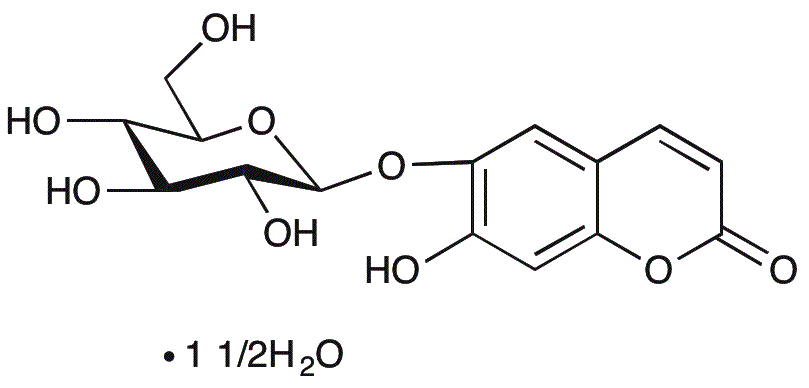Esculin sesquihydrate is widely utilized in research focused on:
- Pharmaceutical Development: It serves as a natural compound in the formulation of medications, particularly for its anti-inflammatory and antioxidant properties, making it valuable in developing treatments for various health conditions.
- Cosmetic Industry: Used in skin care products, esculin sesquihydrate helps protect skin from oxidative stress and enhances skin hydration, appealing to consumers seeking natural ingredients for healthier skin.
- Food Preservation: Its antioxidant properties are leveraged in the food industry to extend shelf life and maintain the quality of food products, providing a natural alternative to synthetic preservatives.
- Research in Plant Biology: This compound is used in studies examining plant defense mechanisms, helping researchers understand how plants protect themselves against pests and diseases.
- Analytical Chemistry: Esculin sesquihydrate is utilized as a standard in various analytical methods, aiding in the quantification of other compounds in complex mixtures, which is crucial for quality control in laboratories.
General Information
Properties
Safety and Regulations
Applications
Esculin sesquihydrate is widely utilized in research focused on:
- Pharmaceutical Development: It serves as a natural compound in the formulation of medications, particularly for its anti-inflammatory and antioxidant properties, making it valuable in developing treatments for various health conditions.
- Cosmetic Industry: Used in skin care products, esculin sesquihydrate helps protect skin from oxidative stress and enhances skin hydration, appealing to consumers seeking natural ingredients for healthier skin.
- Food Preservation: Its antioxidant properties are leveraged in the food industry to extend shelf life and maintain the quality of food products, providing a natural alternative to synthetic preservatives.
- Research in Plant Biology: This compound is used in studies examining plant defense mechanisms, helping researchers understand how plants protect themselves against pests and diseases.
- Analytical Chemistry: Esculin sesquihydrate is utilized as a standard in various analytical methods, aiding in the quantification of other compounds in complex mixtures, which is crucial for quality control in laboratories.
Documents
Safety Data Sheets (SDS)
The SDS provides comprehensive safety information on handling, storage, and disposal of the product.
Product Specification (PS)
The PS provides a comprehensive breakdown of the product’s properties, including chemical composition, physical state, purity, and storage requirements. It also details acceptable quality ranges and the product's intended applications.
Certificates of Analysis (COA)
Search for Certificates of Analysis (COA) by entering the products Lot Number. Lot and Batch Numbers can be found on a product’s label following the words ‘Lot’ or ‘Batch’.
Numéro de catalogue
Numéro de lot/série
Certificates Of Origin (COO)
This COO confirms the country where the product was manufactured, and also details the materials and components used in it and whether it is derived from natural, synthetic, or other specific sources. This certificate may be required for customs, trade, and regulatory compliance.
Numéro de catalogue
Numéro de lot/série
Safety Data Sheets (SDS)
The SDS provides comprehensive safety information on handling, storage, and disposal of the product.
DownloadProduct Specification (PS)
The PS provides a comprehensive breakdown of the product’s properties, including chemical composition, physical state, purity, and storage requirements. It also details acceptable quality ranges and the product's intended applications.
DownloadCertificates of Analysis (COA)
Search for Certificates of Analysis (COA) by entering the products Lot Number. Lot and Batch Numbers can be found on a product’s label following the words ‘Lot’ or ‘Batch’.
Numéro de catalogue
Numéro de lot/série
Certificates Of Origin (COO)
This COO confirms the country where the product was manufactured, and also details the materials and components used in it and whether it is derived from natural, synthetic, or other specific sources. This certificate may be required for customs, trade, and regulatory compliance.


